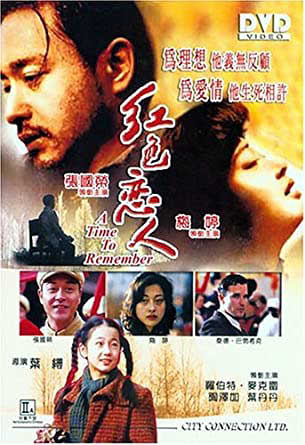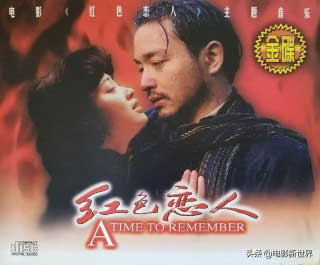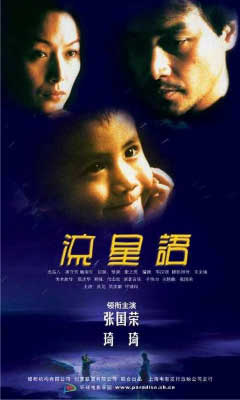

A big deal has been made about the appearance of Jackie Chan, Jet Li and Michelle Yeoh in Hollywood productions. It is pretty well known too that nowadays, Maggie Cheung divides up her time between France and Hong Kong. What seems to have been less remarked upon is the involvement of Tony Leung Kar Fai in “The Lover” (a largely French production), Tony Leung Chiu Wai in the Vietnamese “Cyclo”, and Tony Leung Chiu Wai, Carina Lau, Michelle Reis and Rebecca Pan in the Taiwanese “Flowers of Shanghai”. Then there’s the Canadian passport-holding Leslie Cheung: Who has not only had starring roles in Chen Kaige’s “Farewell My Concubine” and “Temptress Moon” but also was the male lead in the Japanese-Hong Kong joint effort that was “Moonlight Express” along with a work touted as a Mainland Chinese-American-Hong Kong filmic adaptation of a true story written by an American doctor who lived for a time in old Shanghai.
A TIME TO REMEMBER looks to have been shot entirely
on location in Shanghai and its outskirts. Although the copy of this
often visually beautiful film that I viewed was Cantonese dubbed, it reportedly
was screened in Hong Kong (itself) with dialogue that was a mix of English
and Mandarin Chinese. And I am not sure whom among its cast and crew
-- other than Leslie Cheung -- has Hong Kong connections. Yet THE film
that it reminded me the most was not any Mainland Chinese or American effort
which I have viewed but Hong Kong director’s Yim Ho’s “Red Dust”. Principally
like that 1990 (melo)drama which starred the Taiwanese Chinese Brigitte Lin
and Chin Han along with the English-raised Maggie Cheung, this 1998 work
(which was released in Hong Kong one year later than the rest of China) has
political undertones and an emotional emphasis as well as a story which largely
takes place in pre-Communist Shanghai.

Todd Babcock plays Dr. Robert Payne, an American working but also generally living a high life a world away from the Great Depression-struck U.S.A. Late one night, he gets a call from a young woman (portrayed by Mui Ting) to conform to the Hippocratic Oath -- which medical practitioners are supposed to adhere to and she recited at him -- and go with her to treat a seriously ill “Chinaman” (the usually boyish and buoyant Leslie Cheung is actually very convincing in this role) she identifies as her husband. His doing so gets him involved in goings on that up until then he didn’t really consider to be his business -- namely, the ongoing “war” between the then ruling Nationalists and the revolutionary Communists -- since it turned out that the man the doctor worked on was actually a prominent Communist leader (and the woman his devoted assistant).
Right from when Payne gets rounded up along with a whole bunch of probably innocent Chinese women and children as well as men -- and only manages to avoid the fate of the others because he had previously made the acquaintance of the secret police leader (played by Tao Zeru) at a hedonistic social event -- when he goes during the day to deliver some medication to QuiQui (Mui Ting) for Jin (Leslie Cheung), it is very evident that the audience’s sympathies are supposed to be with the Communists. This sense is accentuated by Jin clearly being meant to be by far the most noble individual in A TIME TO REMEMBER and QuiQui the most lovable, if not also loving.
Such would have rendered the film too overwhelmingly propagandistic if not for there also being a fleshing out of the character of the main villainous figure (a former Communist forced at gunpoint to betray his comrades so that his daughter would be spared from harm) and a certain distancing that comes from the story’s narrator being a foreigner rather than either Chinese Nationalist or Communist. In addition, A TIME TO REMEMBER’s focus does really principally seem to be the sacrifices that certain individuals are prepared to make for other persons rather than their commitment to an abstract cause and that which has been described as an “imagined community” (by Benedict Anderson, a political scientist writing about nationalists and nationalism). What a pity that this was not carried through to a satisfactory conclusion. As it was, the feeling that one is left with is that the movie’s ending was just too tacked on.
My rating for the film: 7
